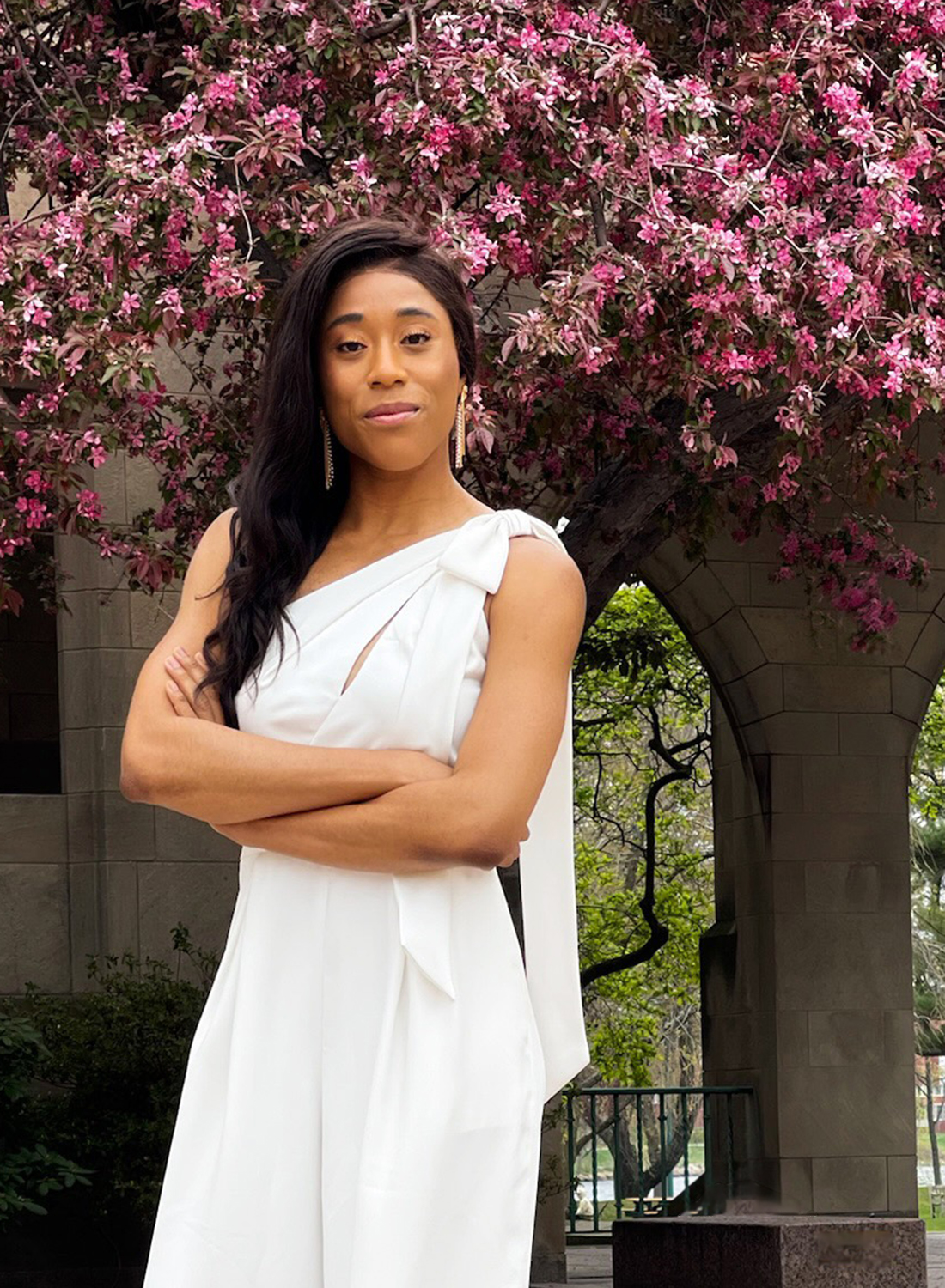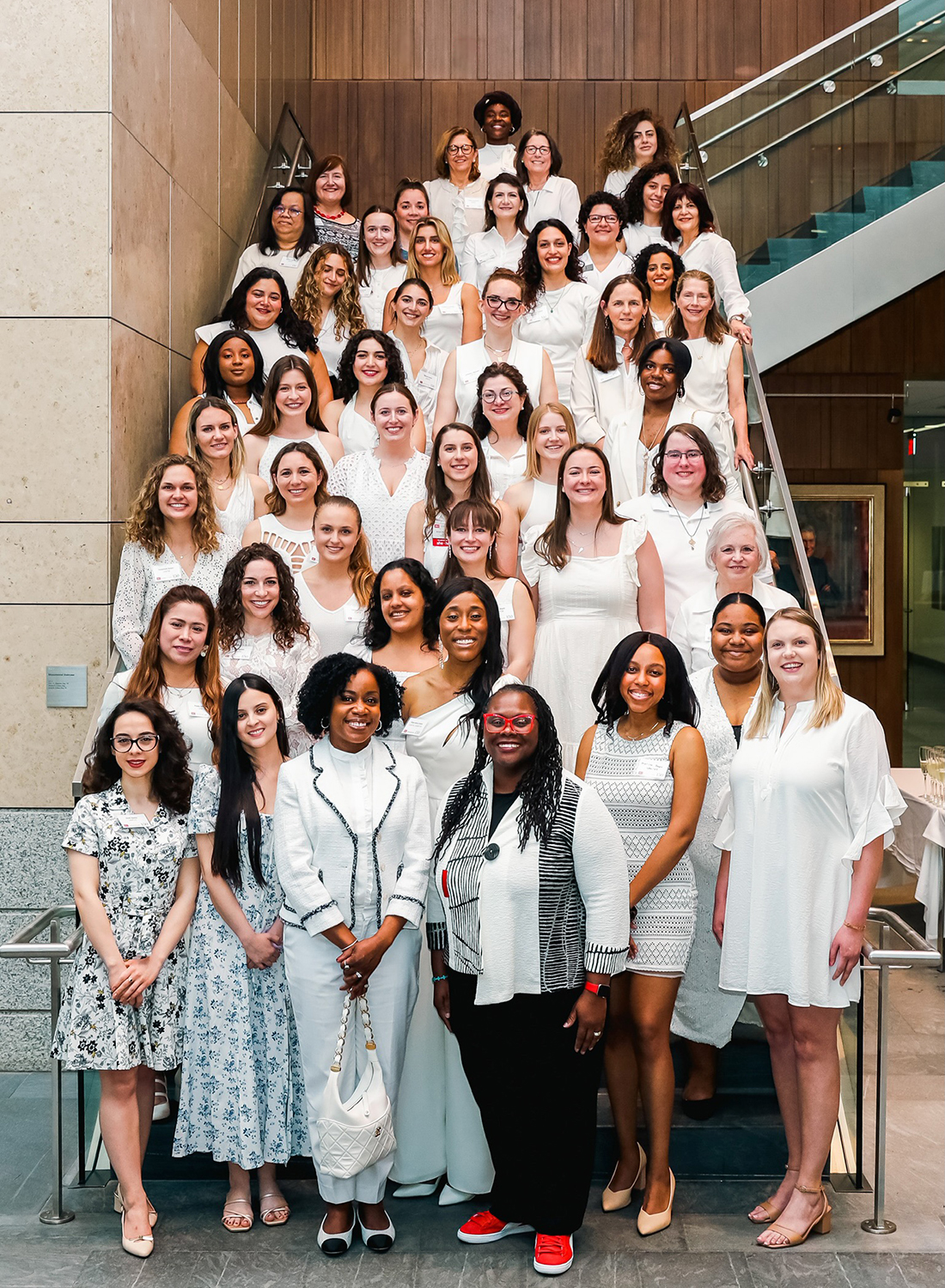Seeking Systemic Change
Kaye-Alese Green (LAW’25, MED’25) wants to leverage law and medicine to create spaces where people can thrive.

Photo by Marlisa Payne
Seeking Systemic Change
Kaye-Alese Green (LAW’25, MED’25) wants to leverage law and medicine to create spaces where people can thrive.
This May, when students graduate from the Boston University Chobanian & Avedisian School of Medicine (MED), among the core competencies they will have achieved are several focused on equity, including: an ability to describe differences in health outcomes and disease burden due to inequities in health care; to understand historical and current drivers of racism, sexism, oppression, and marginalization; and to explain how one’s own identity influences their perspective and decision-making. That’s thanks in part to the work of Kaye-Alese Green (LAW’25, MED’25).
Green helped develop those learning objectives as MED’s inaugural diversity fellow in 2020. Because institutional learning objectives are only modified every decade or so, the curriculum changes will remain in place long after she’s left the campus.
“I’m one person; I’m a drop in the ocean,” she says. “But this was an opportunity to create something that will impact thousands of students and [over the course of their careers] millions of patient interactions.”
Green was always drawn to medicine—her mother is a nurse and her father is a healthcare executive who has worked at hospitals across the country—but she is also passionate about creating systemic changes like the ones she helped bring about at MED. That’s why she decided to earn a dual degree in medicine and law from MED and Boston University School of Law.
“Medicine is often about immediate repair, and, on occasion, preventative [care],” she explains. “But we are not always taught to think structurally. I don’t have the patience for a system that continues to get the same results. I would be like, ‘Why are Jim and I on a first-name basis; why is he in here with another asthma attack? Is it because he lives in a building with mold growing on the walls?’ Nothing in medicine gives me the teeth or skillset to change that. That’s where the law comes in.”
When you think about law and justice, it feels very clear. But when you get to law school, you realize it’s not clear. Often, [the law] is not on the side of the less fortunate; it’s on the side of the more powerful. I want to know the system well enough to provide knowledge to the less powerful.
At BU Law, where Green is finishing her second year, she has tried to focus on classes that address structural systems. She has particularly enjoyed Law & Structural Social Change with Professor Anna di Robilant and Critical Civil Procedure with Associate Professor Portia Pedro. She is also externing with US District Judge Leo T. Sorokin of the District of Massachusetts
“You can’t win the game if you don’t know the rules,” she says. “When you think about law and justice, it feels very clear. But when you get to law school, you realize it’s not clear. Often, [the law] is not on the side of the less fortunate; it’s on the side of the more powerful. I want to know the system well enough to provide knowledge to the less powerful.”
Green attended the University of Central Florida. She studied psychology as an undergraduate student and then earned her master’s degree in urban education and public health in 2015. She spent the next few months in Europe working with refugees and migrants and had just accepted a job in Lebanon when the community she was moving to was bombed. After her father called to express his concern, she decided to return home.
“I felt really lost,” she recalls. “You see people in so much trauma. I really considered, if medicine was worthwhile, knowing it’s a 10-year journey and knowing how much harm is happening now.”
Green worked for two years in finance at her alma mater before committing to BU. In her first year of medical school, she helped create the Racism in Medicine Vertical Integration Group (VIG), which spent a year poring over the school’s textbooks and slides to look for content that discussed race inappropriately. After the group published a 200-page report and an accompanying paper about its findings, Green pitched the idea of taking a year off to help the school implement some of their recommendations.
“I’ve found that strategic plans are very expensive paper weights unless someone is hired to put them in place,” she says.
As MED’s diversity fellow, she worked full time helping the school rethink its curriculum, adopting the antiracism learning objectives, and creating a glossary for cultural transformation, among other projects. The glossary, which students and faculty can refer to in their work and research, will be re-examined periodically to assess whether terms should be updated or changed.
“We had faculty saying, ‘We don’t know what to say,’” she says. “You can’t ask someone to see our common humanity if you don’t have a common language.”
Last summer, Green was awarded a fellowship by the Rappaport Center for Law and Public Policy at Boston College Law School. She worked in the healthcare section of the Massachusetts Attorney General’s office on equity issues, including providing research assistance for the office’s multistate amicus brief in a pair of affirmative action cases heard by the US Supreme Court in October. This year, she has served as the first Black president of the BU Women’s Law Association, a group that she has tried to make as inclusive as possible.

After completing her 2L year, Green will return to medical school until December 2024. She will then finish her final semester of law school and is scheduled to graduate from both institutions in the spring of 2025. Ultimately, she hopes to work with urban children and their families with a focus on trauma. She says her fellowship at MED “solidified” her sense that the dual degree was the right path for her.
“Being in that fellowship during the pandemic and seeing the harms exponentially exacerbated in structurally marginalized communities made it even more clear,” she says. “I want to create space for people to thrive, and that has a lot less to do with [healthcare] and more to do with environment. How can we make neighborhoods safe? Medicine doesn’t offer me all the tools I need. The law does.”
